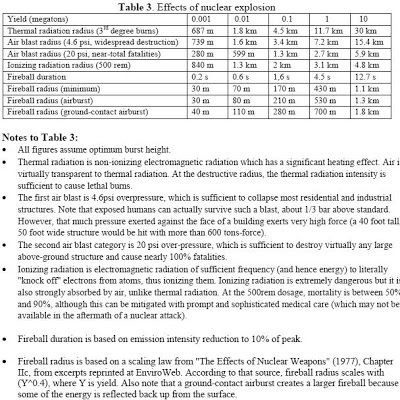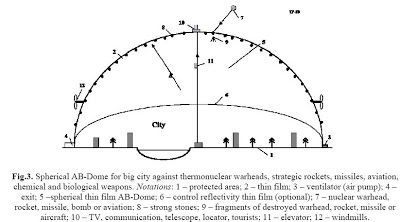Cross posted from Nextbigfuture
Now Alexander Bolonkin has come up with a cheaper, technological easy and more practical approach with thin film inflatable domes. It not only would provide protection form nuclear devices it could be used to place high communication devices, windmill power and a lot of other money generating uses. The film mass covered of 1 km**2 of ground area is M1 = 2×10**6 mc = 600 tons/km**2 and film cost is $60,000/km**2.
The area of big city diameter 20 km is 314 km**2. Area of semi-spherical dome is 628 km2. The cost of Dome cover is 62.8 millions $US. We can take less the overpressure (p = 0.001atm) and decrease the cover cost in 5 – 7 times. The total cost of installation is about 30–90 million $US. Not only is it only about $153 million to protect a city it is cheaper than a geosynchronous satellite for high speed communications. Alexander Bolonkin’s website
The author suggests a cheap closed AB-Dome which protects the densely populated cities from nuclear, chemical, biological weapon (bombs) delivered by warheads, strategic missiles, rockets, and various incarnations of aviation technology. The offered AB-Dome is also very useful in peacetime because it shields a city from exterior weather and creates a fine climate within the ABDome. The hemispherical AB-Dome is the inflatable, thin transparent film, located at altitude up to as much as 15 km, which converts the city into a closed-loop system. The film may be armored the stones which destroy the rockets and nuclear warhead. AB-Dome protects the city in case the World nuclear war and total poisoning the Earth’s atmosphere by radioactive fallout (gases and dust). Construction of the AB-Dome is easy; the enclosure’s film is spread upon the ground, the air pump is turned on, and the cover rises to its planned altitude and supported by a small air overpressure. The offered method is cheaper by thousand times than protection of city by current antirocket systems. The AB-Dome may be also used (height up to 15 and more kilometers) for TV, communication, telescope, long distance location, tourism, high placed windmills (energy), illumination and entertainments. The author developed theory of AB-Dome, made estimation, computation and computed a typical project.
His idea is a thin dome covering a city with that is a very transparent film 2 (Fig.1). The film has thickness 0.05 – 0.3 mm. One is located at high altitude (5 — 20 km). The film is supported at this altitude by a small additional air pressure produced by ground ventilators. That is connected to Earth’s ground by managed cables 3. The film may have a controlled transparency option. The system can have the second lower film 6 with controlled reflectivity, a further option.
The offered protection defends in the following way. The smallest space warhead has a
minimum cross-section area 1 m2 and a huge speed 3 – 5 km/s. The warhead gets a blow and overload from film (mass about 0.5 kg). This overload is 500 – 1500g and destroys the warhead (see computation below). Warhead also gets an overpowering blow from 2 −5 (every mass is 0.5 — 1 kg) of the strong stones. Relative (about warhead) kinetic energy of every stone is about 8 millions of Joules! (It is in 2–3 more than energy of 1 kg explosive!). The film destroys the high speed warhead (aircraft, bomber, wing missile) especially if the film will be armored by stone.Our dome cover (film) has 2 layers: top transparant layer 2, located at a maximum altitude (up 5 −20 km), and lower transparant layer 4 having control reflectivity, located at altitude of 1–3 km (option). Upper transparant cover has thickness about 0.05 – 0.3 mm and supports the protection strong stones (rebbles) 8. The stones have a mass 0.2 – 1 kg and locate the step about 0.5 m.
If we want to control temperature in city, the top film must have some layers: transparant dielectric layer, conducting layer (about 1 — 3 microns), liquid crystal layer (about 10 — 100 microns), conducting layer (for example, SnO2), and transparant dielectric layer. Common thickness is 0.05 — 0.5 mm. Control voltage is 5 — 10 V. This film may be produced by industry relatively cheaply.
If some level of light control is needed materials can be incorporated to control transparency. Also, some transparent solar cells can be used to gather wide area solar power.

As you see the 10 kt bomb exploded at altitude 10 km decreases the air blast effect about in 1000
times and thermal radiation effect without the second cover film in 500 times, with the second reflected film about 5000 times. The hydrogen 100kt bomb exploded at altitude 10 km decreases the air blast effect about in 10 times and thermal radiation effect without the second cover film in 20 times, with the second reflected film about 200 times. Only power 1000kt thermonuclear (hydrogen) bomb can damage city. But this damage will be in 10 times less from air blast and in 10 times less from thermal radiation. If the film located at altitude 15 km, the
damage will be in 85 times less from the air blast and in 65 times less from the thermal radiation.
For protection from super thermonuclear (hydrogen) bomb we need in higher dome altitudes (20−30 km and more). We can cover by AB-Dome the important large region and full country.
Because the Dome is light weight it could be to stay in place even with very large holes. Multiple shells of domes could still be made for more protection.
Better climate inside a dome can make for more productive farming.
AB-Dome is cheaper in hundreds times then current anti-rocket systems.
2. AB-Dome does not need in high technology and can build by poor country.
3. It is easy for building.
4. Dome is used in peacetime; it creates the fine climate (weather) into Dome.
5. AB-Dome protects from nuclear, chemical, biological weapon.
6. Dome produces the autonomous existence of the city population after total World nuclear war
and total confinement (infection) all planet and its atmosphere.
7. Dome may be used for high region TV, for communication, for long distance locator, for
astronomy (telescope).
8. Dome may be used for high altitude tourism.
9. Dome may be used for the high altitude windmills (getting of cheap renewable wind energy).
10. Dome may be used for a night illumination and entertainment










Pressure and heat of an explosion would destroy a film from the outside. Radiation could enter the dome anyway. If my critics aren’t correct because of political strategy (however it may be), just pay a grant https://lifeboat.com/ex/grants to employ experts in science. Experts could outline a protocol as suggested in the message Science Prediction Markets http://www.acceleratingfuture.com/tom/?p=113 to evaluate the security of domes and other scientific theories in a professional way. When financial investments into scientific theories are there, they would accelerate the development of secure technologies.
I urge everybody to read my article about one lost existential risk — i.e. risk of downloading and executing hostile AI during SETI search.
Is SETI dangerous?
http://www.proza.ru/texts/2008/04/12/55.html
Forget Nukes, these domes wouldn’t survive nature!
Hurricanes, earthquakes, lightning and hail. Far more common than a nuke, and all of them will cause Dome damage.
The cost to maintain this is quite ridiculous.
This is a joke… right?
how is it that a train track layed accross a 20 km city costs in the billions, and a dome of this sort is only mere hundereds of millions?
How is the dome anchored to the ground?
I assume there must be HUUGE pressures to keep “strong rocks” up in the sky.
How is the pressure maintained?
How is the pressure maintained during a dome breach, to stop telescopes and “strong rocks” falling from the sky and obliterating the city beneath?
How much would be spent on power to keep the dome inflated, but also ventilated so the city doesn’t melt?
(remember, the sun beams ~1kw of heat per square foot, thats 3.6 MW of heat to ventilate over a 20*20km city, not to mention exhaust fumes from cars and industry)
I’m sorry my friend. Your idea is a flop.
Your ideas are fascinating and of great value to the city dwellers who live in hostile climates. As a videographer I plan on making a documentary that explores the benefits and feasibility of putting them on small to mid sized towns especially those where tourism represents a large part of the local economy. If you have any kind of DVD or other details which may contribute to this project contact me at 320 209‑3838 and dial all ten numbers. Additionally, you may send brochures and other materials to 605 15 St. S 102A — St. Cloud, Minn. 56301 or contact at [email protected]. Thank You.